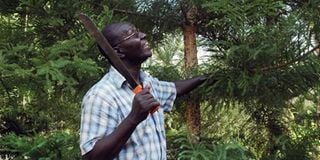With 60,000 trees who is afraid of retirement?

Joseph Kibugi and one of his 1,000 Christmas trees in his South Coast farm. PHOTO | LABAN WALLOGA
What you need to know:
- Forest worker Joseph Kibugi has turned his love for trees into a money-making machine
While many people are scared of retirement, one man in Kwale, has no such worries.
Joseph Kibugi, 53, has secured his future by planting 60,000 trees on a 51-acre piece of land. He has gradually integrated commercial tree farming with fish and livestock farming to generate an additional income. An extension officer at the Forestry Department in Mombasa, Kibugi started growing trees as a hobby when he was 12 years old.
His farm at Mivumoni, Kwale, has 1,000 teak trees, 27,000 casuarinas, 7,000 eucalyptus, 1,000 Christmas trees, 100 arborea and 3,000 graveria for timber at various stages of growth.
Last week he took us around his forest as baboons jumped from tree to tree. It is from here that he narrated his love for trees that started at his father’s farm in Naivasha.
The South Coast Forest Owners Association chairman also has a half an acre under 50 species of ornamental trees that will be sold to commercial or private landscapers in Ukunda.
Here he has a well, seedlings and a fish pond, which cost him Sh350,000.
His serene house is surrounded by shades that protect about 35,000 seedlings from the sun.
A trained forester at Londiani Forest College, Mr Kibugi plants trees during his off days. He estimates that a farmer can make Sh1.2 million a year from a well-irrigated acre of ornamental trees.
The investment in his farm is about Sh2 million and credits his success to advice from the World Wide Fund for Nature, loans from the Agricultural Finance Corporation and the support of the local community.
“AFC gave me the start-up capital of Sh300,000 to establish the forest project in 2008 and in 2011, I got a second one of Sh500,000 to stock livestock whereas WWF offered expert advice,” he says.
Among the tree species grown at his residential area are the unique Peach Ixora, which sells at Sh250 per plant, the Bottle Palm that costs Sh7,500 apiece, Travellers Palm at Sh2,500, Ashok and Holly Plant at Sh250. Other popular tree species at his farm are Fish Tail Palm and the Dwarf Coconut that matures in three years and is going at Sh1,500 per plant. The Romantic Queen of the Night tree sells at Sh250. His main customers are tree farmers, the beach community and tourist resorts.
“The success story is that people who initially bought poles from me as customers realised the gains from the project and now they have been converted to tree owners,” he says.
He started collecting and keeping the trees when he worked in Msambweni.
“I made sure that I collected the varieties from farmers over the years while training them to grow trees. It’s fortunate that at least many farmers have embraced the business at small-scale,” he says.
REPEAT CUSTOMERS
Mr Kibugi says some species are foreign but survive well under tropical conditions. Some come from his repeat customers and people who do similar business from Thailand, Mauritius and Tanzania.
“Through the network, we exchange plants with seeds and it has made my trees species population to increase with time,” he says.
On monthly sales, Mr Kibugi says without aggressive marketing, he earns between Sh100,000 and Sh120,000 a month from his investment depending on his repeat customers.
The association he heads has 50 members who do a combined acreage of 5,000 and have come together to battle brokers.
“We want to have control over the brokers and cut out the chain of middle men in the near future for the farmers to benefit more.” Mr Kibugi warns farmers against crusaders that mislead them with talk of high returns. “In reality, an acre of casuarinas can hold 1,000 trees, and the farmer benefits from about 60 per cent of the mature trees at a cost of Sh400 each. What is communicated to farmers is that the market price is Sh1,000 which is an exaggeration,” he says.
On the future of tree growing, he says there is a big potential as demand for charcoal will keep on rising.
“In urban areas, charcoal is required in large quantities. We don’t have trees for timber, so we are forced to import from the neighbouring countries,” he says.
Mr Kibugi, who also harvests honey from his trees, says the coastal climate is conducive to the growing of timber trees which mature within 12 years.
At his rural home in Kinangop in Nyandarua County, Mr Kibugi has a six-acre farm where he has planted trees on four acres because of good market for forest products especially poles and timber. The other two acres are reserved for his house and agriculture.
When he retires, Mr Kibugi plans to set up a landscaping company and a farm and forestry products firm.




